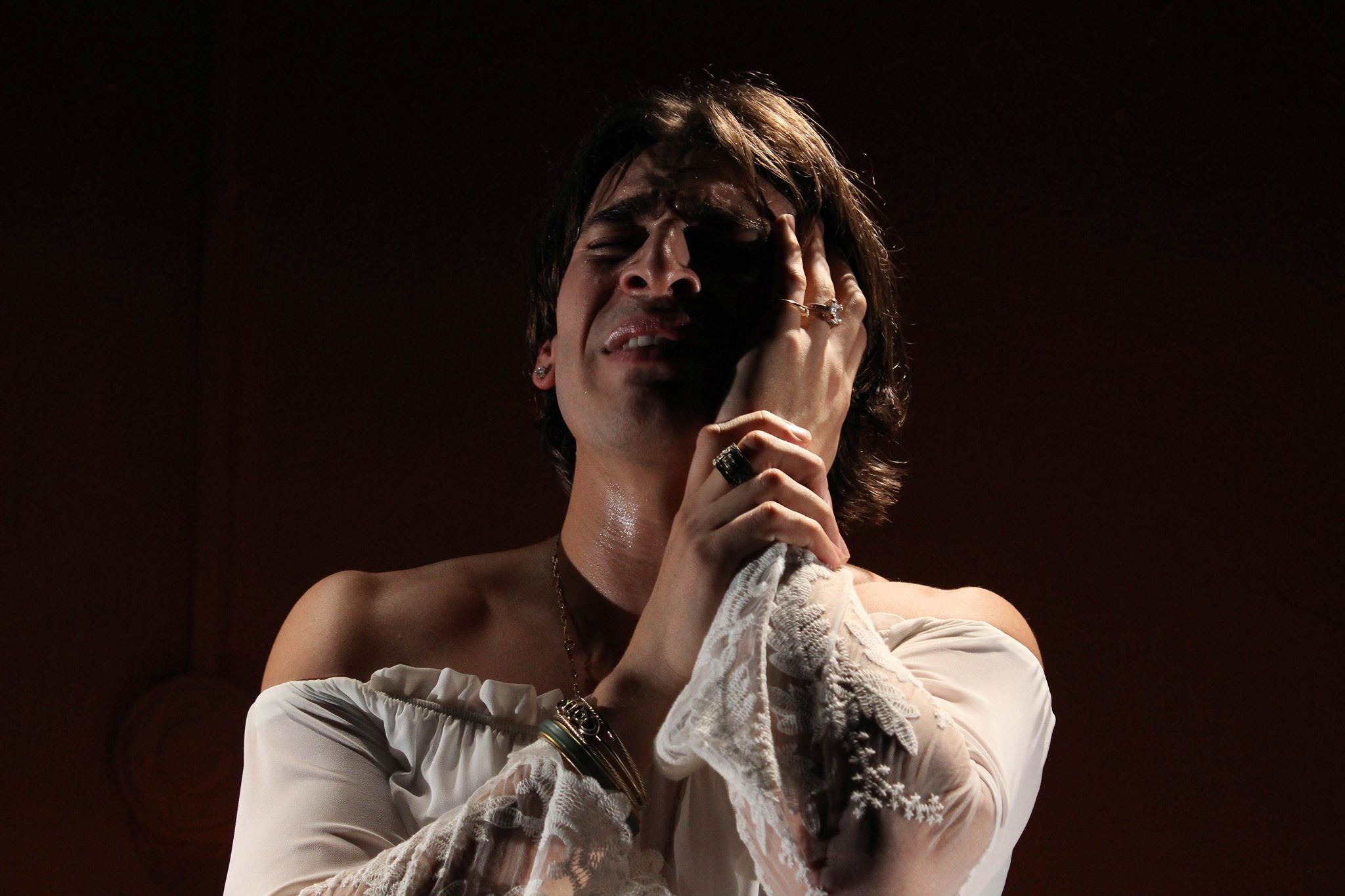Review of Ni Mi Madre, Yale Cabaret
Arturo Soria’s one-man show Ni Mi Madre is in fact a one-woman show, and the woman is Soria’s mother. The idea of conveying the manner and perspective of one’s own mother may seem a tall order to most of us, but Soria’s transformation into his mother enables him to take us on a tour of his mother’s life in her own words. Brazilian, married three times, with nicknames for her husbands and her children—Arturo is the son of her second husband—“Madre” holds court with fascinating panache, her monologue a freewheeling diatribe of reminiscence and self-promotion. She sees herself as comparable to Madonna and Angelina Jolie and, her special hero, Meryl Streep. For Madre, acting is essential to life. A lesson her son seems to have learned at her breast, or even in the womb.
Arturo Soria in Ni Mi Madre (photos: Brittany Bland)
Are we really meeting Soria’s mother? Are the stories she tells true? We can’t know for sure, but the character behind the tales is forceful, funny, domineering and able to play upon pathos for effect. An “every-mother” in a sense, but there is nothing generic in the stories she tells. Soria’s play, directed by Danilo Gambini, puts the actor's own relationship to his mother under scrutiny as we hear her view of him—her gay artist son—and of anyone and anything her roving attention fixes upon. Being in the audience is a little like eavesdropping on a private conversation between Soria and his mother, but it’s also like being a voiceless interviewer, with Madre volunteering answers to questions we didn’t ask, or didn’t know to ask.
Abetted by strategic lighting and music and sound effects of the sea, Madre keeps us riveted in a way that would please anyone who loves attention. She shares her stories to convince us of her suffering but also of her resilience. She is never defeated. She makes mistakes—such as beating Arturo for a childhood infraction without knowing all the details—and she can turn on a dime from demanding sympathy to displaying scant sympathy for others.
Arturo Soria in Ni Mi Madre
Madre flings herself about a box filled with sand meant to be a beach, with plants, mementos and photographs arranged in one wing, and, at the other, a chair beneath a life-size painting of a woman who invites comparisons to a Madonna, an angel, a Vogue model. A subtext of the show is the question of how we relate to our mothers—as individuals and within a culture that “worships” motherhood but treats women and mothers as less than fully valued adults. A cult of the mother is also a cult of the child, the two are essentially linked and women are often judged for not being mothers or for being bad mothers, according to some slippery standard.
Madre knows all this. She believes her children are part of her, always. She insists upon herself as their origin but also, in a complex sense, their identity. Arturo—who she calls her heart—is looked upon as the one who will repay her by becoming famous and making her famous. Some version of “my son the star” floats through her fantasies, as a pay back for the slights she suffered from her own mother.
Arturo Soria in Ni Mi Madre
Soria complicates his portrait of his mother with the fact that she has lost her own mother, and her mourning calls up deep resentments and a stronger insistence upon her own virtues. In evoking, quite tellingly, a humiliating story about her mother, Soria lets us see both his mother’s pity for her mother and her power over her. There’s a sense in which the worship of the mother becomes something close to religious and, for that reason, she can be made into an idol that must be profaned (something artists such as Proust understood well).
Against what an artist son might make of her, Madre gives voice to her own voluble passion and personality. Whether or not Ni Mi Madre (“not my mother”) is true to life of Soria’s own mother, an image of Soria the artist comes through in what Madre says of her Arturo: manic, talented, good-looking, more feminine than his sister, he becomes an image of what Madre would be if she could.
Frustrated with the lack of sexual attention her husband gives her, she flirts with the idea of sleeping with a lesbian, though she says she doesn’t desire women. Would she be happier as a gay man? Perhaps, except for the fact that who she is has been determined by what she has produced with her vagina. We know her because she is Arturo’s mother, but, even without him, she is a mother.
Arturo Soria in Ni Mi Madre
Arturo Soria is a born performer, and in Ni Mi Madre he performs the person from whom he was born. It’s a striking symbiosis indeed, and makes for a wonderfully vibrant portrayal of an inseparable duo.
Ni Mi Madre
A play written and performed by Arturo Soria
Directed by Danilo Gambini
Producer: Jaime Francisco Totti; Scenic Designer: Stephanie Osin Cohen; Costume Designer: Cole McCarty; Lighting Designer: Krista Smith; Sound Designer: Kathy Ruvuna; Dramaturg: Madeline Charne; Technical Director: Bryanna Kim; Stage Manager: Madeline Charne; Associate Sound Designer: Megumi Katayama
Live music performed by Ariel Rodriguez
Yale Cabaret
October 26-28, 2017



